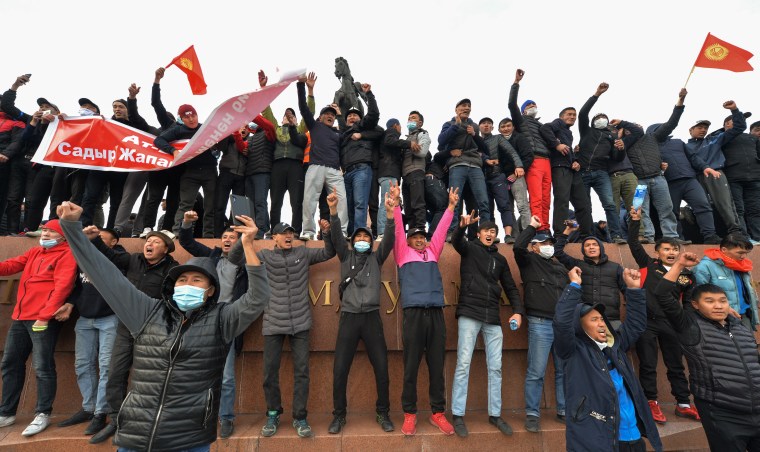New York, October 15, 2020 – Kyrgyz authorities should immediately arrest and prosecute those responsible for threatening and attacking journalists covering post-election unrest in the country, and implement measures to protect members of the press, the Committee to Protect Journalists said today.
In Kyrgyzstan, a number of attacks on journalists and threats to media outlets have been reported since October 4 parliamentary elections, which were voided, followed by nationwide unrest and an ongoing political crisis and state of emergency, according to news reports, CPJ documentation, and a report by the Kyrgyz independent nonprofit organization Media Policy Institute. Yesterday, the Kyrgyz parliament held an emergency meeting and named Sadyr Japarov, a nationalist politician freed from prison by supporters, the country’s new prime minister, according to news reports.
Today, President Sooronbay Jeenbekov resigned, according to media reports.
“It is crucial that journalists can safely and freely cover the political crisis in Kyrgyzstan,” said CPJ’s Europe and Central Asia program coordinator, Gulnoza Said. “Kyrgyz authorities must investigate reported attacks and threats targeting the journalistic community, and put a stop to hostilities toward reporters who are doing their work.”
Radio Azattyk, the Kyrgyz service of the U.S. Congress-funded broadcaster Radio Free Europe/Radio Liberty, and its journalists have faced several attacks, threats, and other attempts to obstruct reporting since October 4, according to Venera Djumataeva, director of the service, who spoke with CPJ in a phone interview, and news reports.
On October 4, police officers–who have not been identified–prevented Radio Azattyk correspondent Ernist Nurmatov from entering polling station No. 5303 in the southern city of Osh, where the journalist went to cover the parliamentary elections, according to Djumataeva. Zamir Sydykov, press secretary of the Osh city department of the Ministry of Internal Affairs, told Radio Azattyk over the phone that the police had the right to prevent a journalist from entering a polling station, Djumataeva said.
Also on October 4, unidentified men pushed another Radio Azattyk correspondent, Aygerim Akylbekova, and hit her camera; she was covering elections at polling station No. 6108 in the northwestern city of Talas, Djumataeva told CPJ. She said the journalist, concerned for her safety, interrupted her reporting and left the station. Akylbekova filed a police report regarding the attack, but the police have not contacted the journalist to follow up on her complaint, according to Djumataeva.
On October 6, an unknown person hit Radio Azattyk correspondent Dastan Umotbai Uulu, who was covering a rally in support of then President Jeenbekov in Osh, Djumataeva told CPJ. The journalist did not say where on his body he was hit, or provide any more information on who hit him, according to Djumataeva. She said the journalist, who was wearing a vest marked “Press” and protective gear, was not injured, but due to the hostile attitude of the protesters he stopped his reporting on that rally and left the location.
On October 9, a group of protesters assaulted another Radio Azattyk correspondent, Aybek Biybosunov, who was wearing journalistic protective gear and a marked vest, while he was covering a pro-Japarov rally near the Government House in Bishkek, the capital, according to news reports and Djumataeva. She told CPJ that a group of about five people pulled Biybosunov’s arms and kicked him in the legs, while yelling that Azattyk was not covering the events “correctly” and that they would “show them”; the journalist left the location due to these threats.
Starting around October 6, Radio Azattyk’s website and its social media accounts have been targeted by thousands of messages, both signed and anonymous, ranging from insults to direct threats to the outlet and its Kyrgyz office, Djumataeva told CPJ.
One of the threats that CPJ reviewed–distributed through the messaging service WhatsApp and sent to Azattyk’s office phone via that app–stated, “Repost! Today, there is a threat of attack on the office @azattykmedia. Currently they only have one guard. Asking for a repost.” Other threats, posted as commentson Azattyk’s Instagram page, said: “Soon people will be destroying your office, Azattyk,” “People will destroy Azattyk very soon,” and “Let’s go to burn down Azattyk.” CPJ reviewed screenshots of all these messages. Azattyk reported the threats to Facebook, which said it is investigating, according to Djumataeva.
Djumataeva told CPJ that Azattyk had recruited volunteers to provide security at the outlet’s officein Bishkek.
CPJ emailed the Ministry of Internal Affairs for comment on the attacks on Radio Azattyk and its journalists, but did not receive a response.
Other news outlets, including Kyrgyz independent news website Kaktus.Media, Russian state-funded information agency Sputnik Kyrgyzstan, and Kyrgyz independent information agency 24.kg, have received numerous threats, both on- and offline, and have had to rely on volunteer guards to secure their offices, according to a report by 24.kg and the agency’s correspondent, Ruslan Kharizov, who spoke with CPJ via messaging app.
Kharizov told CPJ that volunteers from the organization Nash Bishkek (Our Bishkek) sent their guards to 24.kg’s office on October 9. “I have worked in journalism for six years, and this is the first time I see such hostilities towards journalists,” Kharizov told CPJ. “While covering pro-Japarov rallies, I always hear threats towards journalists, statements that we have sold out, that we are dishonest. We keep being threatened and harassed every day.”
According to the 24.kg report and Sputnik, on October 10 a group of between 25 and 30 people went to the office of Sputnik Kyrgyzstan in Bishkek, threatened the journalists there, and demanded that the outlet immediately send a correspondent to cover a rally in support of Japarov, threatening to otherwise break through the office’s door and wreck the office; the group eventually left the premises without breaking into the office.
CPJ called Sputnik and Kaktus.Media, and emailed and messaged them on social media for comment, but did not immediately receive a response. CPJ also emailed the Ministry of Internal Affairs for comment on these incidents, but did not receive a response.
